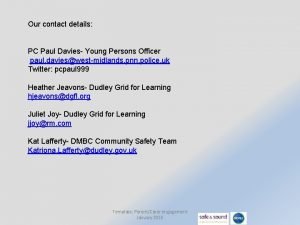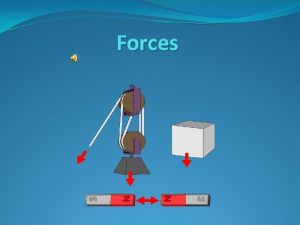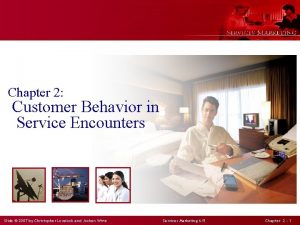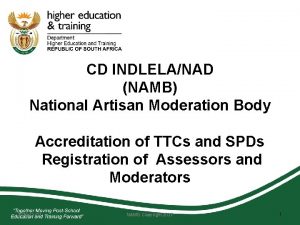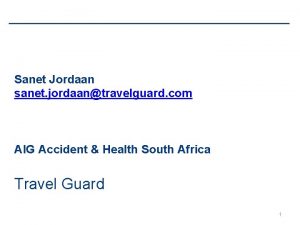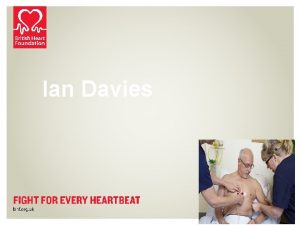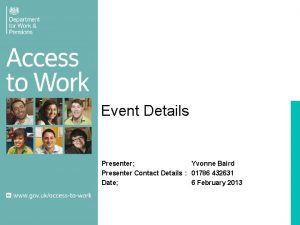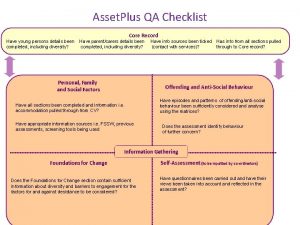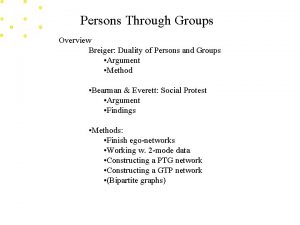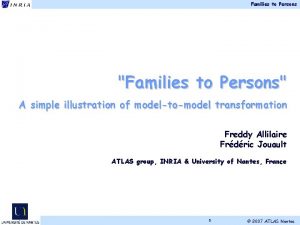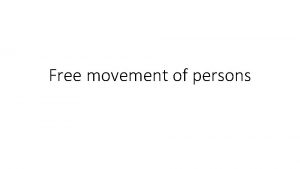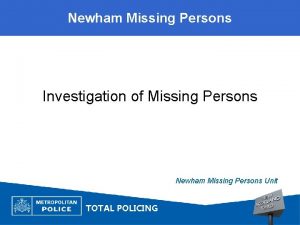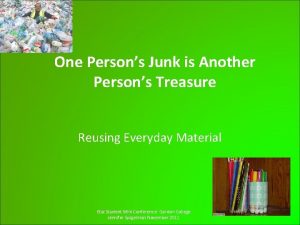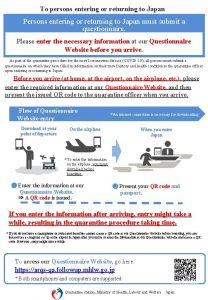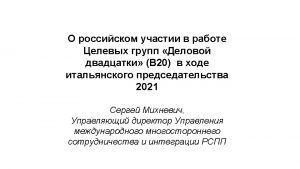Our contact details PC Paul Davies Young Persons





























- Slides: 29

Our contact details: PC Paul Davies- Young Persons Officer paul. davies@west-midlands. pnn. police. uk Twitter: pcpaul 999 Heather Jeavons- Dudley Grid for Learning hjeavons@dgfl. org Juliet Joy- Dudley Grid for Learning jjoy@rm. com Kat Lafferty- DMBC Community Safety Team Katriona. Lafferty@dudley. gov. uk Template: Parent/Carer engagement January 2018

Online safety awareness for parents and carers Presenter: ( insert own graphics) Suggested introduction videos- NCA CEOP Offender Animation Where’s Klaus? Do you know where your children are tonight?

Digital Parents • Safety is about behaviour • Keeping children safe is about parenting! Parenting Online • Really no different to what we already do • Set and adjust boundaries-age/maturity related • Get to know what applications your children and their friends use • Model good behaviour- you are a role model • Provide guidance and ensure they are shared with family members Keep talking to them How to protect your children? You could remove the hazards and minimise the risk. How? At what cost? These only work until someone works out how to bypass them! If you rely on a technological solution to stay safe how will your child cope when the technology fails or they are using their devices elsewhere? Template: Parent/Carer engagement January 2018

Digital Resilience • Employ the same parenting skills you use offline to keep them safe, such as negotiating boundaries, talking about the difficult subjects we’d all rather avoid, helping your child to recognise what’s good and bad behaviour. • Set fair and consistent rules in relation to your child’s internet use at home. As they get older, try to agree the rules with them so that they have some control over their digital world. • Teach your child to think critically about what they read, see or hear online. Helping your child to understand that and to pause and think about the impact of things that are posted online, will help them cope with some of the difficult behaviour they will come across and avoid getting caught up in it. • Maintain a positive outlook on your child’s use of the internet, if you constantly criticise the apps and games they love, they’re not going to want to talk to you about their online life. • Children who can recover from an online mistake can learn and avoid making the same mistake again. You can help by making it easy for them to talk to you about their mishaps (that means trying to keep calm even if you’re at your wits’ end!), making sure they know where to go for help if they need it, and recognising if they’re not recovering well, so you can step in and get help for them. • Allow your child to explore and take charge of their online life. Template: Parent/Carer engagement January 2018

Technical solutions ( information that can be signposted via your web site) There are four main places you can find parental controls, and it can help to set up a combination of these: Internet provider: you can set up filters to help block access to inappropriate content on any device that connects to your home Wi-Fi Mobile operator: filters are often automatically set up on mobile contracts, but you can double-check with your provider Devices: many devices have parental control settings, for example, to help restrict spending in apps or disable location functions Online services: sites like BBC i. Player, Sky, Virgin Media and You. Tube have parental control settings or passwords to help restrict access to inappropriate content Template: Parent/Carer engagement January 2018

Technical solutions ( information that can be signposted via your web site) Children are accessing the internet on a range of different devices. You can now access the internet wherever and whenever you want. Devices connect to the internet in three main ways, and you might want to consider filtering options: 3 G/4 G: this provides access to the internet when you're on the go, and is often provided as part of your mobile phone contract. Filters are often set up by default, but you can check with your mobile operator to ensure they are activated for your children's devices. Connect to your home Wi-Fi: devices can connect to the internet at home (and this saves using up your 3 G/4 G data allowance). All of the major internet providers offer free filtering tools that work across all devices connected to the home internet. The UK Safer Internet Centre provides guides from BT, Sky, Talk and Virgin Media. Access public Wi-Fi: it's also possible to connect to public Wi-Fi when you're out and about, with shops, cafes and restaurants increasingly offering internet access. The Friendly Wi-Fi symbol means the content has been filtered. Template: Parent/Carer engagement January 2018

What sites do you use? ( personalise to reflect trends) Template: Parent/Carer engagement January 2018

Trends amongst youngsters: Net-Aware What sites do your children use? http: //www. net-aware. org. uk/networks/? order=-popularity# Template: Parent/Carer engagement January 2018

Anonymous chat apps 4 Chan-Anonymous image board where users can discuss and post pictures in a specific thread Whisper is an anonymous social networking app. Users post confessions, either fact or fiction, by super imposing text on a picture. Ask fm-Users follow each other anonymously. But kids also can be very visible, such as filming and posting video responses to user questions and sharing personal photos on the site. Template: Parent/Carer engagement January 2018

Anonymous chat apps Yik. Yak is an anonymous social media app for i. OS and Android. It allows people, pseudo-anonymously, to create and view discussion threads within a 5 -mile radius (termed "Yaks" by the application). Kik is a free messaging app for smartphones. You log in, you pick a user name, and you send texts, selfies, and emojis to your friends. Crucially, you can find and chat with total strangers on Kik. Two of the top five internal apps are ‘Flirt!’, which gives you a list of users in your age range to, flirt with, and Match & Chat, a Tinder-for-Kik that lets you swipe left or right on users and chat with the people who swipe right on you too. Template: Parent/Carer engagement January 2018

Report Abuse/Concerns Are you worried about online sexual abuse or the way someone has been communicating with you online? https: //www. ceop. police. uk/safety-centre/ If you are being bullied you can talk to Childline. https: //www. childline. org. uk/ Don’t forget you can speak to someone at school. Template: Parent/Carer engagement January 2018

Common Issues ( focus as appropriate/add/delete/amend) Sexting/revenge porn Emotional health and well being Sextortion Cyberbullying Grooming Trolling Self-trolling Template: Parent/Carer engagement January 2018

Cyberbullying ‘Cyberbullying is bullying that takes place over digital devices like mobile phones, computers, and tablets. Cyberbullying can occur through SMS, text and apps, or online in social media, forums, or gaming where people can view, participate in, or share content. Cyberbullying includes sending, posting, or sharing negative, harmful, false, or mean content about someone else. It can include sharing personal or private information about someone else causing embarrassment or humiliation. Some cyberbullying crosses the line into unlawful or criminal behaviour. ’ The most common places where cyberbullying occurs are: • Social Media sites such as Facebook, Instagram, Snapchat and Twitter • SMS (Short Message Service) also known as text messages sent through devices • Instant Message (via devices, email provider services, apps and social media messaging features) • Email Remember cyberbullying happens ‘in and out of the school gates’. It doesn’t stop at the end of the school day, it can happen 24 / 7 in a child or young person’s own bedroom and can have an audience of millions. Template: Parent/Carer engagement January 2018

Legal Implications Guidelines on prosecuting cases involving communications sent via social media The Crown prosecution service has released guidelines (Dec 2013) around cases involving communications sent via social media. These guidelines explain how these communications will be considered under current law and include four reasons why somebody may get into trouble for behaviour using new technologies (e. g. social networking, blogs, emails, mobile phones etc): Credible threats If a threat is made towards a person or to damage property and it is believed that threat may be carried out Communications targeting specific individuals This can include communications (text, pictures, videos etc) sent by more than one person (e. g. cyberbullying / trolling by lots of people aimed at one person) or sent to more than one person (e. g. cyberbullying / trolling a group of people) Template: Parent/Carer engagement January 2018

Legal Implications Guidelines on prosecuting cases involving communications sent via social media Breach of court orders If a judge has made an order that certain information or pictures should not be shared online and then it is shared Communications which are grossly offensive, indecent, obscene or false Most of these communications will fall into one of the first three, this one is for really bad communications – NB the offence is actually sending the communication – nobody needs to have seen it once sent Template: Parent/Carer engagement January 2018

Sexting is when someone shares sexual, naked or semi-naked images or videos of themselves or others, or sends sexually explicit messages. They can be sent using mobiles, tablets, smartphones, laptops - any device that allows you to share media and messages-rf NSPCC. Is sexting against the law? Having sexting photos, text messages or videos on your phone or computer: If you are under the age of 18, the law sees you as a child. Therefore, if you have any indecent images or videos of somebody who is under 18 you would technically be in possession of an indecent image of a child – even if you are the same age. This is an offence under the Protection of Children Act 1978 and the Criminal Justice Act 1988. Sending sexting photos or videos If you are under 18 and you send, upload or forward indecent images or videos onto friends or boyfriends/girlfriends, this would also be breaking the law, even if they are photos of yourself ('selfies'). http: //www. telegraph. co. uk/news/uknews/crime/11840985/Teenage-boy-added-to-policedatabase-for-sexting. html Template: Parent/Carer engagement January 2018

Sexting However, as of January 2016 in England Wales, if a young person is found creating or sharing images, the police can choose to record that a crime has been committed but that taking formal action isn't in the public interest. Crimes recorded this way are unlikely to appear on future records or checks, unless the young person has been involved in other similar activities which may indicate that they're a risk. ( your educational establishment’s policy and procedure for dealing with these instances may need to be reinforced at this point) Template: Parent/Carer engagement January 2018 What is posted online can stay with you for ever!

Sexting -NSPCC/Child. Line survey Six out of 10 teenagers say they have been asked for sexual images or videos. Of those questioned, 40% said they had created a sexual image or video, and about a quarter said they had sent one to someone else by text. "It is almost becoming the norm that a young person in a relationship should share an explicit image of themselves. ’’ For the survey, NSPCC and Child. Line spoke to 450 teenagers from across the country. Of those who had sent an image or video to someone else by text, 58% said the image had been sent to a boyfriend or girlfriend, but a third said they had sent it to someone they knew online but had never met. About 15% said they had sent the material to a stranger. Of those who said they had sent a photo to someone, 20% said it had then been shared with other people, while 28% said they did not know if their picture had been shared with anyone else. Template: Parent/Carer engagement January 2018

Revenge Porn The malicious disclosure of private sexual photographs and films without the consent of the person featured. • ‘Revenge porn’ is a growing trend in the UK ( update with suitable news story) 200 cases: http: //www. bbc. co. uk/news/uk-england-south-yorkshire-42240932 • Again, pictures can be impossible to remove having an extremely negative impact on careers and relationships • If the victim is under 18, it will still be an offence under the protection of children act • Criminal Justice and Courts Act 2015: The 2015 act has created the new offence which will criminalise the malicious disclosure of photographs or films. The disclosure must take place without the consent of at least one of those featured in the picture disclosed and with the intention of causing that person distress. The offence will carry a two year maximum custodial penalty. Template: Parent/Carer engagement January 2018

Sextortion ( web cam blackmail) Sextortion is the use of blackmail and incitement, whereby victims are forced into generating and sending indecent images of themselves to the offender. The victim may be asked to pay money to prevent the offenders publishing the indecent images (coining the phrase ‘sextortion’). Offenders tend to assume a fake online profile (a young teenage girl or boy) and begin communicating with children. The conversations soon move on to a sexual nature with the victim sending images of themselves. The offender then either saves these images and, after revealing their true age/gender (although not always), attempts to blackmail the child, either for cash or further more serious indecent images. The offender threatens to share the original image(s) with friends and family via the internet unless that child does what the offender is asking. As well as asking for further sexual acts, some offenders have asked for other degrading acts to be performed. In some cases the abuse spirals so out of control that victims have attempted serious self harm or have actually committed suicide as the only way of escaping the abuse. Template: Parent/Carer engagement January 2018

Sextortion ( web cam blackmail)- June 2015 The family of a County Tyrone teenager who took his own life after a gang blackmailed him over intimate photographs. . . Gerard and Teresa Hughes said a Nigerian gang demanded more than £ 3, 000 from their son. They then sent images of him to his friends on social media. . Afterwards Ms O'Neill said there were lessons to be learned from how the case had been handled. "Coming from such a tragic event there now appears be a step change in how such cases will be dealt with, " she said. “For instance Facebook previously waited three to four days following a complaint from a police service to remove a page. ” The Hughes family were given reassurances that any such pages will now be removed immediately following such a complaint. "Further to this the family were informed that the PSNI have now issued guidance to all its officers as to how to deal with such cases and will be increasing training in this field”. "It is clear that this is a growing area for crime and needs to be focused on. " Template: Parent/Carer engagement January 2018 Ronan Hughes Iulian Enache, 31, shared intimate photos belonging to Ronan after the schoolboy failed to pay a ransom. He was jailed for 4 years.

Trolling ( use a relevant news story involving a celebrity) Trolling is when an individual (or group) posts offensive and hurtful messages online, such as on social network sites, chat rooms, online forums or blogs etc, with the intent of upsetting others. Robin Williams's daughter, Zelda, has excused herself from social media after receiving cruel and offensive messages following his death. . Ms Williams said she intended to delete the Twitter app from her devices “for a good long time, maybe forever, ” after several users sent her graphic, ‘Photoshopped’ images of her father. The 25 -year-old, who is herself an actor, also left her Instagram account dormant. “I will be leaving this account. . . while I heal and decide if I'll be deleting it or not, ” she wrote in a caption. “In this difficult time, please try to be respectful of the accounts of myself, my family and my friends. ” Template: Parent/Carer engagement January 2018

Emotional Health and well-being The effects of social media on mental wellbeing-rf Internet matters. org An overview of the research generally points to 3 main factors when it comes to why the overuse of social media can negatively impact on the mental health of young people: 1. Impact on Sleep Heavy usage can have a negative impact on physical well being which in turn can affect mental health. This is particularly relevant when it comes to sleep disturbance. Several studies have linked sleep difficulties to screen time. 2. Use as life comparing tool While social media was initially set up as a means of connecting with others, it is now also used as a means of comparing. It has become a barometer of how we measure up to others and this is a particular issue for young people who are socialized through the school system to ‘grade’ themselves in relation to their peers. The nature of social media is such that most people present the highlights of their lives more regularly than the boring stuff, so these highlights appear to be the norm. Template: Parent/Carer engagement January 2018

Emotional Health and well-being 3. Chasing likes on posts to drive self-worth / self-esteem Being too active on Social media and worrying about regularly posting pictures and status updates has been linked to anxiety, poor body image and diminished mental health. …. This preoccupation with how other people react to what we post on social media can lead young people to feel unsure about their value. They may start to worry about how they are seen, making them more self-critical of both their physical appearance and their lives in general. Constant posting may also open them up to receiving more negative or mean comments on line, rather than compliments or praise. Potentially they may be more at risk of being cyberbullied, which has been linked to serious depression and even suicidal behaviour in extreme cases. Template: Parent/Carer engagement January 2018

Self-trolling (use a relevant news story) Tragic teen Hannah Smith was not targeted by anonymous trolls on Ask. fm detectives believe. Instead detectives believe the troubled 14 -year-old sent herself abusive messages on the popular social networking website. Popular schoolgirl Hannah was found hanged in her bedroom inside her family home in Lutterworth, Leics. last August 2013. Dozens of abusive anonymous messages were found on Hannah’s Ask. fm profile following her death - raising fears she had been targeted by trolls. But during a pre-inquest review into her death it emerged there was no evidence she was the victim of trolling. Dad Dave, 45, revealed after the hearing at Leicester Town Hall that police told him Hannah sent the anonymous messages to herself. Ask. fm said that 98% of the messages had come from the same IP address as Hannah’s. A source said: “The company have looked at every identity - the IP addresses are trackable. She posted the anonymous things herself”- rf Daily Mail. Template: Parent/Carer engagement January 2018

Grooming used to be a complex activity requiring manipulation of the child and their environment – this has been simplified by technology (available 24/7), ease of access to children through IT communications, naivety of parents, carers and protectors and the availability of a number of social networking sites • Grooming process may take minutes, hours, days or months • Groomers remain at different phases depending on the dynamics between their goals, needs or style and the reactions of the young person • Offenders tend to use what worked previously • Use a wide range of internet facilities to contact young people • Use multiple identities • Use blackmail (sextortion ) • No ‘one size fits all’ – range and fluidity of behaviours Template: Parent/Carer engagement January 2018

What can we do? Parents/carers can't possibly be on top of all of the systems their children use Any internet enabled device can give access to web based systems. Parents/carers don’t always understand why their children ‘share’ over social networking sites. BUT: Keep the lines of communication with your children as open as possible and work together to figure out what's appropriate for them, in terms of safety, privacy, reputation and time management Keep up to date with changing privacy settings Talk with your children about their favourite tools – with genuine interest, not fear, because they're more likely to come to you if they ever need help Share concerns with other family members and school/college Template: Parent/Carer engagement January 2018

Useful Links and resources for parents and carers https: //www. dudleysafeandsound. org/onlinesafety https: //www. thinkuknow. co. uk/parents/Listing/? cat=75&ref=4824#m. Main ( online safety films to watch with your children) http: //parentinfo. org/ https: //www. internetmatters. org/ https: //www. saferinternet. org. uk/advice-centre/parents-and-carers/resources-parents-and-carers https: //www. getsafeonline. org/ https: //parentzone. org. uk/system/files/attachments/Digital%20 Parenting%206%20 NEW. pdf http: //www. net-aware. org. uk/networks/? order=-popularity# Fact Sheet- A comprehensive list of Information and Online resources http: //www. childnet. com/parents-and-carers http: //www. childnet. com/ufiles/online-safety-calendar-2017 -2019. pdf https: //www. barclays. co. uk/digital-confidence/eagles/ Template: Parent/Carer engagement January 2018

Questions Template: Parent/Carer engagement January 2018
 One person's trash is another person's treasure
One person's trash is another person's treasure Pc paul davies
Pc paul davies Which force
Which force Friction unit
Friction unit Is air resistance a non contact force
Is air resistance a non contact force Contact and noncontact forces
Contact and noncontact forces Irritant contact dermatitis vs allergic contact dermatitis
Irritant contact dermatitis vs allergic contact dermatitis Contact vs noncontact forces
Contact vs noncontact forces Shottky contact
Shottky contact Post encounter stage in service marketing
Post encounter stage in service marketing Contact vs noncontact forces
Contact vs noncontact forces Air resistance contact force
Air resistance contact force Namb contact details
Namb contact details Raksha claim intimation
Raksha claim intimation Ajith colonne
Ajith colonne Nac burial fund 2020 banking details
Nac burial fund 2020 banking details Mandatory grants
Mandatory grants Myerscough college foundation learning
Myerscough college foundation learning Teta accredited providers list
Teta accredited providers list Eduard jordaan cats
Eduard jordaan cats Old apostolic church burial fund
Old apostolic church burial fund Sacap contact details
Sacap contact details Legal metrology department delhi
Legal metrology department delhi Fp&m seta contact details
Fp&m seta contact details Dmc debt management contact number
Dmc debt management contact number Signal words
Signal words Example of signal words
Example of signal words Paul pousson contact info
Paul pousson contact info Paul sheward contact info
Paul sheward contact info Paul monus contact info
Paul monus contact info

